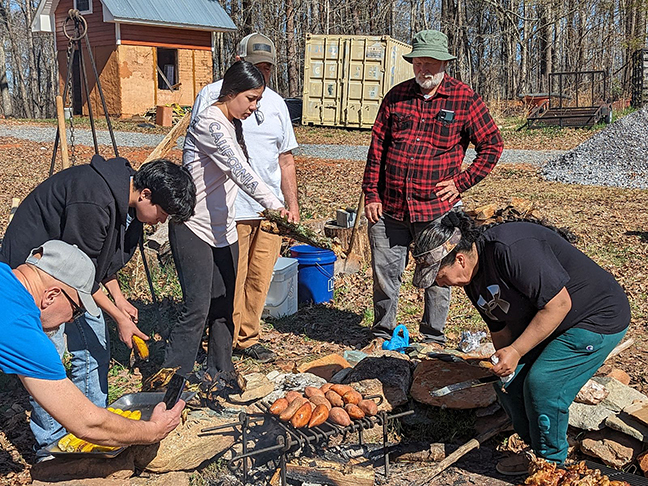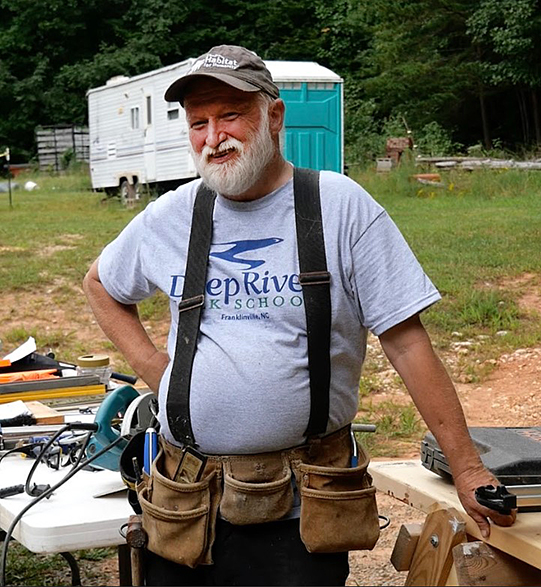Welcome!

Deep River Folk School attendees practice skills and methods of outdoor cooking. Contributed photo
Learn a skill, make a friend at Folk School
FRANKLINVILLE — From teepees to solar power, Deep River Folk School is teaching hands-on skills in a group setting.
Workshops are held each third Saturday of the month through November at 282 Rising Sun Way, Franklinville. There are morning and afternoon sessions and lunch is provided.
The school’s website, https://www.deepriverfolkschool.com, explains the motivation of the organization.
“Responding to the many challenges facing people in the 21st Century, the Deep River Folk School provides a space to learn and share ideas, skills, and tools for long-term sustainable, resilient living.
“As a partnership between Sustenance Farm, which provides the space and infrastructure, and the non-profit Living Well Earth Stewards which provides the administration, the Deep River Folk School focuses on five main topic areas:
— Food.
— Shelter.
— Essential Skills.
— Understanding the Natural World.
— Building Healthy Communities/Connections.”
Harvey Harman, director of the school, was joined recently by volunteers Laurie Cone and Charlotte Vetter to talk about their efforts.
Harman said Deep River Folk School started in 2019 by a “group that included farmers, crafters, builders, health professionals, artisans, environmentalists, food enthusiasts and self-sufficiency advocates. The Folk School draws on learnings from traditional cultures and equally from more modern technologies and insights. It’s a place where people can meet, learn, share, support and encourage each other to have the skills and resources to prepare for the future with all its uncertainties.”
Harman said a typical Saturday workshop will draw four to 10 people from all over. They’ve hosted learners from the Piedmont Triad, the Triangle, Charlotte and points in between.
With 20 to 30 instructors, varying from year to year, a workshop can include a choice of skills in the morning and one or more classes in the afternoon. Classes last from 9-11:45 a.m. with a break for lunch, then 1-3:45 p.m. in the afternoon.
At the May 18 workshop, attendees had the morning option of Growing and Producing Your Own Fiber From Animals & Plants or Learning From Traditional Cultures: The Ancient Skill of Bark Basket Making. In the afternoon, there was either The Art & Skill of Turning Locally Produced Fiber into Useful Products or Homemade Soap & Candle Making: Traditional Important Crafts for the Home.
There’s even a wilderness skills day in November, when you can “learn basic wilderness skills while bonding over a series of outdoor activities that build resilience and personal confidence. The day will focus on four areas of wilderness skill: navigating in the woods or wilderness, shelter and staying safe, food gathering/harvesting, and fire building/outdoor cooking.”
At the June 15 meeting, you can learn to ferment beer, wine or meade, or “learn the many options and examples for temporary and alternative structures,” such as tents, teepees, tarps, yurts, or even cars, vans, buses and campers. In the afternoon, you can develop song leading and song writing skills or produce a biochar for soil fertility while combating climate change.
“These are some of the same skills my grandmother’s generation knew,” Vetter said. “We have lost those skills, basic skills we’re not dependent on with our supply chain. Now we hire somebody or go to the store.”
“We’re building a network of people to help and encourage each other,” Harman added.
“It’s an exchange of skills,” Cone said. “It’s amazing the people who come and what their skills are.”
All this teaching while making it fun.
“There’s a lot of interaction,” Harman said. “We’re doing an activity and learning something. We’re interacting with others. People enjoy that as much as the information.”
Just like the old days. Vetter said, “I remember people sitting around peeling apples for apple butter.”
Or shelling peas or shucking corn or even building a barn, back in the day when neighboring farmers helped each other.
“It all ties together,” Harman said. “People come for different reasons.”

Cone recalled the May workshop when “we had two people with textiles, one did plants and the other did animals.” Cotton and wool can both be turned into fabrics.
Then there’s the new interest in tiny homes. Those workshops normally last from Friday through Monday.
“Tiny homes are on a scale people can take on,” said Harman, director of construction and land acquisition/development at Chatham Habitat for Humanity. One of his passions is designing and building small and tiny houses.
“This is part of what we’re trying to tap into,” he said, “the opportunity to not only learn skills but that it’s valued and important. People who know how are honored.”
And that’s one of the factors drawing people to the Folk School. As Cone said, “Making things — that’s pretty appealing to all ages. People like making stuff.”
“We’re not saying it’s what everybody needs to do but it’s a chance for people to access,” Harman said. “It’s very fulfilling to know how to do things.”
And maybe it’s just the right time.
“We live in a world with unpredictability,” Harman said. “People feel a little bit vulnerable. This is a way to decrease vulnerability.
“Some things we want to do because we know what it is (when we have our hands on it), (such as) growing food and knowing its nutrition and quality. We have more say about parts of our lives.”
Most of what’s taught at Deep River Folk School can be learned on the internet. Harman, though, prefers face-to-face learning.
“My favorite part is the people,” he said. “In person, you have a different experience. It’s better learning but it’s feeding the soul. It’s nourishing on multiple levels. The authenticity is different from reading a book or watching something.”
“Its the community sharing experience with other people,” Vetter agreed.
“I love the concept of learning old skills, people making things,” Cone said. “It’s important for me to learn how to do things but doing it in a community.”
“It’s a combination of preserving old skills and sharing new skills,” Harman said. “The context of doing with other people is the important part. That makes it more interesting, more fun.”
The Deep River Folk School website has a schedule of the 2024 workshops and a list of the instructors and their qualifications. Contact information is available as well as the opportunity to apply for workshops.
What is a Folk School?
The Folk School movement grew out of Denmark in the late 1800s. The focus is on life-long learning and sharing of skills, knowledge and tools with one another rather than passing tests or earning degrees.
At the Deep River Folk School, all workshops are facilitated by a skilled workshop leader. High priority is given to experiential, hands-on learning at a pace that works for all. Workshops are open to both youth (if accompanied by a sponsoring adult taking the same workshop) and adults.
